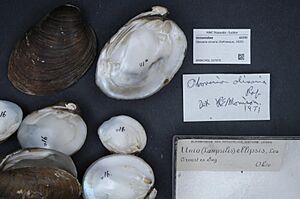Obovaria olivaria facts for kids
Quick facts for kids Obovaria olivaria |
|
|---|---|
 |
|
| Conservation status | |
| Scientific classification |
|
| Kingdom: | Animalia |
| Phylum: | Mollusca |
| Class: | Bivalvia |
| Order: | Unionida |
| Family: | Unionidae |
| Genus: | Obovaria |
| Species: |
O. olivaria
|
| Binomial name | |
| Obovaria olivaria (Rafinesque, 1820)
|
|
| Script error: The function "autoWithCaption" does not exist. | |
| Synonyms | |
|
List
|
|
Script error: No such module "Check for conflicting parameters".
The Obovaria olivaria is a type of freshwater mussel. It's also known as the hickorynut. This aquatic creature is a bivalve, which means it has two shells that hinge together, like a clam. It's a kind of mollusk and belongs to the family called Unionidae, which are often called river mussels.
About the Hickorynut Mussel
The hickorynut mussel is originally from eastern North America. You can find it in the rivers and lakes that drain into the Ohio River, the St. Lawrence River, and the Great Lakes.
Its Unique Life Cycle
Like many mussels, the hickorynut mussel has a special way of growing up. Its tiny young, called larvae, need to attach to a fish for a short time to develop. For the hickorynut mussel, these larvae only attach to sturgeons. This makes their survival extra tricky because sturgeons themselves are rare in many places.
Why It Needs Our Help
Even though the IUCN says the hickorynut mussel is of "least concern" globally, it's actually in danger in many parts of its home. This is especially true near the Great Lakes and in Canada.
Organizations like NatureServe keep track of how many mussels are left. They believe the hickorynut mussel has completely disappeared (become extirpated) from states like Kansas, Alabama, and Ohio. It might also be gone from Nebraska and Pennsylvania. Protecting these mussels and their homes is important for keeping our rivers healthy.
 | DeHart Hubbard |
 | Wilma Rudolph |
 | Jesse Owens |
 | Jackie Joyner-Kersee |
 | Major Taylor |



